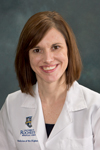News from Pediatrics
News from Pediatrics
Forever Chemicals, Lasting Effects: Prenatal PFAS Exposure Shapes Baby Immunity
Wednesday, July 23, 2025
 New research reveals that tiny amounts of PFAS—widely known as “forever chemicals”—cross the placenta and breast milk to alter infants’ developing immune systems, potentially leaving lasting imprints on their ability to fight disease.
New research reveals that tiny amounts of PFAS—widely known as “forever chemicals”—cross the placenta and breast milk to alter infants’ developing immune systems, potentially leaving lasting imprints on their ability to fight disease.
University of Rochester Medical Center (URMC) researchers tracked 200 local healthy mother–baby pairs, measuring common PFAS compounds in maternal blood during pregnancy and then profiling infants’ key T‑cell populations at birth, six months, and one year. By age 12 months, babies whose mothers had higher prenatal PFAS exposure exhibited significantly fewer T follicular helper (Tfh) cells—vital coaches that help B cells produce strong, long‑lasting antibodies—and disproportionately more Th2, Th1, and regulatory T cells (Tregs), each linked to allergies, autoimmunity, or immune suppression when out of balance.
“This is the first study to identify changes in specific immune cells that are in the process of developing at the time of PFAS exposure,” said Kristin Scheible, MD, an associate professor of Pediatrics and Microbiology & Immunology at URMC and lead author of the study, which appears in the journal Environmental Health Perspectives. “Identification of these particular cells and pathways opens up the potential for early monitoring or mitigation strategies for the effects of PFAS exposure, in order to prevent lifelong diseases.”
Read More: Forever Chemicals, Lasting Effects: Prenatal PFAS Exposure Shapes Baby ImmunityNew Recreation Upgrades on Erie Canal Provide Opportunities for Disabled Community
Monday, June 9, 2025
The Erie Canal now has adaptive recreational equipment for people with physical disabilities. The equipment includes bikes, kayaks, and more. The initiative is a collaboration between Golisano Children's Hospital, the Strong Center for Developmental Disabilities (SCDD), the Erie Canal Boat Company, and other partners.
Read More: New Recreation Upgrades on Erie Canal Provide Opportunities for Disabled CommunityGolisano Children’s Hospital Holds Annual Prom Night
Sunday, May 11, 2025
The Golisano Children’s Hospital gave patients the chance to dress up and dance at their annual prom night Saturday.
Read More: Golisano Children’s Hospital Holds Annual Prom NightFour Women Fulfill Lifelong Dream of Becoming Nurses at Golisano Children's Hospital
Tuesday, May 6, 2025
In recognition of National Nurses Week, a group of women who have dreamed of becoming nurses since childhood are now fulfilling that ambition at Golisano Children’s Hospital. These four women work in various fields, helping children grow to their fullest potential.
Read More: Four Women Fulfill Lifelong Dream of Becoming Nurses at Golisano Children's HospitalUnderstanding Autism: What It Is and What It Isn’t
Wednesday, April 9, 2025
 Autism is complex and sometimes misunderstood. Myths and misinformation associated with autism can harm the autism community and perpetuate health disparities. Understanding autism starts with defining what it is—and what it isn’t.
Autism is complex and sometimes misunderstood. Myths and misinformation associated with autism can harm the autism community and perpetuate health disparities. Understanding autism starts with defining what it is—and what it isn’t.
Learn the facts from our experts Suzannah J. Iadarola, PhD, director of the Strong Center for Developmental Disabilities and associate professor of Pediatrics, and Emily Knight, MD, PhD, a clinician scientist in the Departments of Pediatrics, Developmental & Behavioral Pediatrics, and Neuroscience.
What is Autism?
Autism Spectrum Disorder (ASD) is a developmental difference that affects how people may perceive, experience, and interact with the world around them
While experiences vary widely, common characteristics include:
- Differences in social interaction and communication.
- Repetitive behaviors and focused interests.
- Sensory differences, including heightened sensitivities to sounds, lights, or textures; intense interest in sensory input; or both.
Is Autism a Mental Illness?
No, autism is not a mental illness—it is not an illness at all. Autism is a neurodevelopmental difference that primarily affects how a person thinks, perceives, and interacts with others.
It is important to know that some people with autism may experience co-occurring mental health conditions like anxiety and depression. These are separate from autism but are common within the neurodiverse community.
Read More: Understanding Autism: What It Is and What It Isn’t